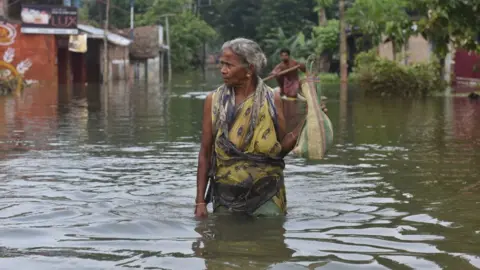Climate change: The IPCC environmental warning India cannot ignore
 Getty Images
Getty ImagesIf the Intergovernmental Panel on Climate Change (IPCC) report was just about rushing countries to cut their carbon emissions to avoid a climate catastrophe, India could perhaps afford to look the other way.
The third largest carbon emitter of the world, after China and the US, India has maintained that it is on course to outperform its Paris climate agreement pledge to reduce its carbon footprint by 33-35% from 2005 levels by 2030.
The Paris climate goal is to keep global average temperature rise to well below 2C and strive for 1.5C to prevent runaway climate change.
But the IPCC report has indicated that the latter target is fast slipping out of reach because countries are not cutting down carbon emissions fast enough, causing global temperature to rise.
India has not followed suit even after several other major carbon emitters announced that they would become carbon neutral by 2050, not even after China set for itself the 2060 deadline.
But this IPCC report has something that the second most populous country in the world - that was ranked seventh in a major climate risk index of 2019 - cannot ignore.
'Locked-in climate systems'
Among the most serious findings of the sixth assessment report of the UN's climate science organisation is that some of the climate systems of the planet have already seen irreversible changes due to unabated global warming.
 Ankit Srinivas
Ankit Srinivas"The scale of recent changes across the climate system as a whole and the present state of many aspects of the climate system are unprecedented over many centuries to many thousands of years," the report says.
Climate scientists say that can mean extreme weather events influenced by such disturbed climate systems like oceans and atmosphere will keep getting worse and so will their impact.
"Some climate systems have locked in [because of the warming humans have caused]," Professor Jonathan Bamber, a glaciologist with University of Bristol and one of the authors of the latest IPCC report, told the BBC.
"So, even if we stopped all carbon emissions, there will be some damages."
What's in it for South Asia?
The IPCC report has projected heat waves and humid heat stress to be more intense and frequent in South Asia during the 21st Century.
It also says that both annual and summer monsoon precipitation will increase during the 21st Century.
"A general wetting across the whole Tibetan Plateau and the Himalaya is projected, with increases in heavy precipitation in the 21st Century."
 Getty Images
Getty ImagesThe report also highlights how urbanisation will exacerbate climate impacts like floods.
"There is high confidence in an increase in pluvial flood potential in urban areas where extreme precipitation is projected to increase, especially at high global warming levels."
Extreme weather events like heavy precipitation leading to floods and landslides, heat waves causing wildfires, or sea storms and cyclones are influenced by the Earth's climate systems.
And if the systems have been destabilised by unabated warming, experts say, the extreme events they influence are bound to intensify and become more frequent.
Extreme weather displacement
Over the past 10 decades, 20 million people every year have been forced from their homes by weather-related disasters, according to the international charity, Oxfam. It says the number of such disasters has tripled in the past 30 years.
The UN estimated that 1.23 million have died and 4.2 billon have been affected by droughts, floods and wildfires since 2000.
India's own first-ever climate change assessment report published by the government last year found that both the frequency and intensity of droughts had increased significantly between 1951 and 2016.
 Getty Images
Getty ImagesIt warned that heat waves would intensify by four-fold by the end of the century.
India is one of the 17 countries where water stress is extremely high, according to a 2019 global report by the World Resources Institute.
It shows that the country is running out of ground and surface water and is listed alongside countries in the Middle East and North Africa where large swathes are deserts.
Last year, a single event, Cyclone Amphan, affected 13 million people, causing $13 billion in damage, according to the Overseas Development Institute.
Pandemic's punch
Battered by the pandemic, the Indian economy is struggling to stand back.
That may be a reason for the Indian government to not announce any date so far to become carbon neutral or to come up with new ambitious carbon reduction targets.
But just because there is the pandemic, extreme weather events turbocharged by climate change will not stop or even slow down.
Experts rather warn that such disasters may further intensity if countries resort to fossil fuel burning to reboot their Covid-ailed economies - ending up further warming the planet.
Accelerating extreme events largely due to destabilised climate systems are something India will have to deal with head on - even if it chooses to park the issue of whether or not to raise its carbon reduction targets for now.